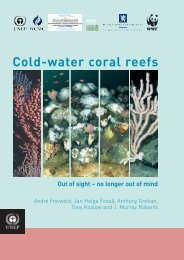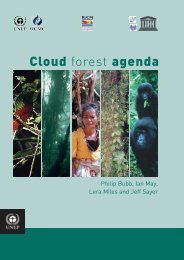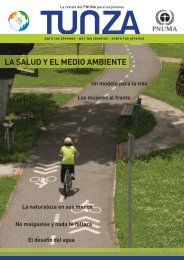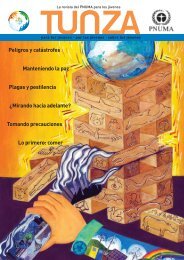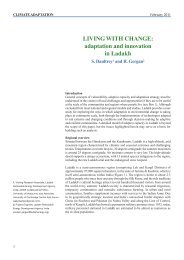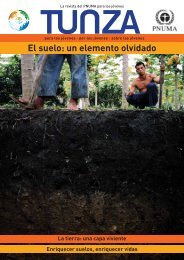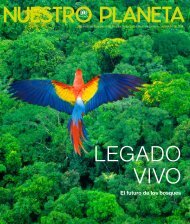BIODIVERSITY - Our Planet
BIODIVERSITY - Our Planet
BIODIVERSITY - Our Planet
Create successful ePaper yourself
Turn your PDF publications into a flip-book with our unique Google optimized e-Paper software.
coverage may have doubled in the<br />
past two decades, but many unique<br />
habitats are protected only in name.<br />
Alarmingly, funding for biodiversity<br />
projects — particularly by the World<br />
Bank — has fallen significantly in the<br />
past three years.<br />
If we are to get back on track to<br />
meet these global challenges we<br />
need to invest in nature, so as to<br />
improve the livelihoods of the poor.<br />
A new World Resources Institute<br />
report, Banking on Nature’s Assets,<br />
presents a roadmap for multilateral<br />
development banks (MDBs) —<br />
key financiers of developing<br />
countries — on how to do exactly<br />
that, presenting strategies and tools<br />
they can employ in mainstreaming<br />
ecosystem services into their policies,<br />
programmes and projects.<br />
The MDBs are moving slowly in<br />
the direction of factoring ecosystem<br />
services into decision-making.<br />
But to strengthen the business case<br />
for investing development dollars in<br />
ecosystems, they need to expand the<br />
focus of their cost-benefit analysis<br />
beyond marketed goods, such as<br />
timber and crops, to include nature’s<br />
regulating and cultural services.<br />
“We need protect nature<br />
both for people’s, and its<br />
own, sake. Action<br />
on one front will strengthen<br />
outcomes on the other.”<br />
Such an approach highlights the<br />
value of ecosystem services that<br />
often do not show up in a traditional<br />
accounting approach. In Costa Rica,<br />
for example, pollination by wild bees<br />
from adjacent forests boosted<br />
coffee yield close to forests by a<br />
quarter: protecting forests thus<br />
translated into additional yield worth<br />
$60,000 a year on just one farm.<br />
In Belize, tourism generated by coral<br />
reefs and mangroves represented<br />
12-15 per cent of GDP in 2007. In<br />
Thailand, the economic value of<br />
mangroves rose from around $800 to<br />
over $35,000 per hectare when their<br />
role in providing coastal protection<br />
and fish nurseries was included in a<br />
cost-benefit analysis.<br />
Up-front assessment of ecosystem<br />
service trade-offs can also improve<br />
risk management, leading to more<br />
robust and equitable development.<br />
Dams supplying power to cities,<br />
or irrigation for agriculture, often<br />
depend on upstream forests to<br />
prevent erosion and reservoir<br />
siltation. Yet they can undermine a<br />
river’s capacity to support fisheries<br />
or sustain downstream wetlands<br />
that provide coastal communities<br />
with water filtration and coastal<br />
protection. Similar trade-offs<br />
can exist for developing country<br />
shrimp farms which increase export<br />
markets, but often at the expense<br />
of the coastal protection and fish<br />
nursery services provided by the<br />
mangroves they replace. Palm oil<br />
plantations, increasing in South-East<br />
Asia, likewise trade off the myriad<br />
ecosystem services provided by<br />
primary forests — including carbon<br />
storage, pollination, and erosion<br />
control — against exports.<br />
The MDBs and their partner<br />
countries need to build national<br />
capacity to design policies and<br />
incentives that align the interests<br />
and actions of farmers, forest<br />
owners, and other users of natural<br />
resources with sustaining rather<br />
than degrading ecosystem services.<br />
One way of doing this is to pay users<br />
for ecosystem services, but other<br />
possible approaches include:<br />
• land zoning to protect<br />
ecosystem service hotspots;<br />
• eliminating perverse subsidies<br />
that support activities that<br />
degrade ecosystems;<br />
• reforming taxation policies to<br />
target those who benefit from<br />
or degrade services; and<br />
• certifying such sustainably<br />
produced goods as timber,<br />
palm oil, and shrimp.<br />
There is concern that the trend<br />
towards ecosystem services<br />
approaches will mean less money and<br />
attention for protected areas.<br />
In fact the opposite can be true. We<br />
need protect nature both for people’s,<br />
and its own, sake. Action<br />
on one front will strengthen<br />
outcomes on the other.<br />
How can governments, MDBs<br />
and UN agencies help to scale up<br />
ecosystem services-based approaches?<br />
While experts on either side of the<br />
environment-development divide<br />
peer through this glass wall more<br />
often these days, the wall itself it is<br />
still too often there in development<br />
finance institutions and national<br />
governments. Most economic and<br />
environment ministries are still at an<br />
early stage of learning to speak each<br />
other’s languages.<br />
Such global institutions as the World<br />
Bank, UNEP and UNDP can play<br />
a crucial role in bridging the divide.<br />
They could convene ministers and<br />
economists to shape macroeconomic<br />
solutions to the linked problems of<br />
ecosystem degradation and poverty.<br />
They could communicate the<br />
business case that healthy ecosystems<br />
are fundamental to economic<br />
development. And they could<br />
provide guidance on investments<br />
in ecosystem services, and on<br />
integrating the value of natural<br />
capital into national accounts — as<br />
through UNEP’s The Economics of<br />
Ecosystems and Biodiversity project.<br />
As October’s much-anticipated<br />
10th meeting of the Conference of<br />
the Parties to the Convention on<br />
Biological Diversity approaches,<br />
MDBs and UN agencies should<br />
ponder how to take a lead in<br />
shattering the glass wall impeding<br />
progress on both preserving nature<br />
and combating poverty.<br />
OUR PLANET OUR LIFE 25



